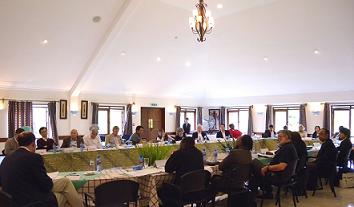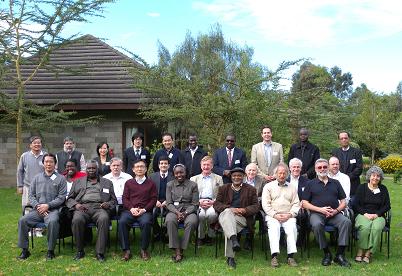Ties that Bind Ethnic Diversity to Stability: A Workshop for Greater Economic Development
2010.11.16
Conventional wisdom dictates a negative correlation between ethnic diversity and stability, both political and economic. To ascertain the truth in this assumption, and to uncover how ethnic diversity may actually affect stability and economic development, JICA-RI in collaboration with Kobe University is conducting the research project, "Ethnic Diversity and Economic Instability in Africa: Policies for Harmonious Development." Through this project, a symposium was held in Naivasha, Kenya, to examine this topic as it pertains to the country.
Held on November 5 and 6, the workshop, the third of a four-part series, applied the theories and frameworks devised during the preceding workshops (held in Kobe University and Yale University, respectively) to analyze in detail Kenya as a case study. In light of the ethnically-charged, violent upheaval witnessed during and after the nation's 2007 elections followed by the international intervention and subsequent political calm of today, and in consideration of the recently-ratified national constitution, the members of the research team deemed the country an appropriate and practical case environment in which to apply their theories.

The research team, comprised of specialists in disciplines ranging from political science to economics, to anthropology and history, each applied their expertise to different aspects of Kenya to uncover connections between its ethnic diversity and economic situation. One underlying assumption the participants based their research on was that horizontal and vertical inequalities - inequalities among groups of people who share a common identity, or among social classes/ranks, respectively - play a major role in the instability of Kenya. The workshop served as a platform to present and review each other's interim findings.
Prior to the workshop, the participants attended a meeting and a public forum featuring Kenya Prime Minister Raila Odinga who spoke on "negative ethnicity" being a product of manipulation by the more unethical regimes of the past, and relayed his expectations for the nation's new constitution. Hiroyuki Hino, JICA expert in Kenya serving as an advisor to Odinga and the research project leader, attended the event along with Keiichi Tsunekawa, Director of JICA-RI, who provided remarks at the meeting.
During the workshop itself, one expert historian echoed Odinga's remarks when describing ethnicity and its frequent politicization as a tool employed by both colonial and post-colonial regimes. Setting the tone for the subsequent discussions, he stated to everyone's agreement that antagonism within ethnicity is not inherent in Kenya, but is a byproduct of the power structure and "rules of competition" that accentuate the horizontal and vertical inequalities within society, thereby destabilizing the country.
It was unanimously agreed that further economic development and growth is imperative for Kenya. One researcher argued that scale economies may be better achieved by encouraging cross-border interaction among similar ethnic groups in different countries. Along the same lines, a socio-economic experiment on Kenyan ethnic groups suggests that certain characteristics of economic behavior among ethnic groups may contribute to greater economic stability. Another researcher surmised that social (income) class will overtake ethnicity as the dominant identity among Kenyans in the future.
Citing causes of violence, one expert suggested a connection between ethnic composition and spatial segregation, especially in cases of conflict-related displacement. From an empirical study, another expert implied that providing education (particularly for girls) in an attempt to empower the disadvantaged and diffuse violence actually leads to a willingness to further question authority and voice one's dissatisfaction, thereby increasing one's likelihood of espousing politically-motivated violence.
The results of all research findings through this project will be construed and published as a book in the future. Individual research will also be published as working papers available for download on the JICA-RI website. The fourth and final workshop through this project will be held in Oxford, UK, in 2011 and will focus on practical policy recommendations based on the collective research.
The JICA-RI project "Ethnic Diversity and Economic Instability in Africa: Policies for Harmonious Development" seeks linkages between ethnic diversity and economic instability and aims to identify policies that diminish the impact of ethnicity as a cause of instability. The project exemplifies JICA-RI's commitment to sustainable growth and poverty reduction - two of its main research areas.


事業事前評価表(地球規模課題対応国際科学技術協力(SATREPS)).国際協力機構 地球環境部 . 防災第一チーム. 1.案件名.国 名: フィリピン共和国.

事業事前評価表(地球規模課題対応国際科学技術協力(SATREPS)).国際協力機構 地球環境部 . 防災第一チーム. 1.案件名.国 名: フィリピン共和国.

事業事前評価表(地球規模課題対応国際科学技術協力(SATREPS)).国際協力機構 地球環境部 . 防災第一チーム. 1.案件名.国 名: フィリピン共和国.

事業事前評価表(地球規模課題対応国際科学技術協力(SATREPS)).国際協力機構 地球環境部 . 防災第一チーム. 1.案件名.国 名: フィリピン共和国.

事業事前評価表(地球規模課題対応国際科学技術協力(SATREPS)).国際協力機構 地球環境部 . 防災第一チーム. 1.案件名.国 名: フィリピン共和国.
scroll